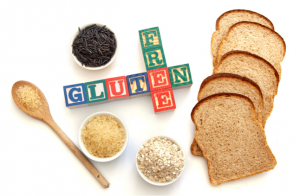By Megan Crockhart, Nutritionist
This is the question being asked quite frequently lately as there are more oat products coming onto the market which are claiming to be gluten free/wheat free.
As a general rule of thumb, it has always been the case to advise Coeliacs and gluten intolerant people to avoid all gluten and oats has always been inclu ded in the list of glutinous grains.
ded in the list of glutinous grains.
Various studies have taken place over the past 20 years to find out more about oats and if they do in fact contain gluten. The general consensus of these studies is that oats do NOT contain gluten (gliadin) the protein found in wheat, rye and barley. Oats are not even related to these grains.
These studies have also shown that most gluten intolerant children and adults along with Coeliacs experience no adverse effects from consuming oats.
A number of the studies indicate that 20-50g a day of oat products is safe in a gluten free diet.
What the studies have highlighted is that some Coeliacs can be sensitive to the protein in oats called Avenin. Although “less than 1% of celiac patients show a reaction to a large amount of oats in their diets”.
Oats also contain fructans which are fermentable and can cause digestive problems in some people. This fermentation in the body can be mistaken for gluten intolerance. Wheat also contains fructans and is why some people are wheat intolerant, but not necessarily gluten intolerant.
Emphasis has been made on the processing of oats and this is where most people needing to avoid gluten need to be weary. Most commercial oats are processed with and contaminated by wheat and particularly barley, which is where the testing of oats can show gluten levels.
Finding gluten free oats is crucial for those wanting to add oats into their gluten free diet. Such products as Gloriously Free Uncontaminated Oats or Bob’s Red Mill Wheat free oats have been processed in a gluten free environment with no cross contamination with wheat, barley or rye.
In Australia our current labelling laws prohibit oats as being called “gluten free” and only the term “wheat free” can be used when it comes to oats. The Australia New Zealand Food Standards Code sets out that a food can’t be claimed to be gluten free if it contains oats or their products.
The labelling laws are different in the USA, Canada, Finland and Sweden, in that they can use the term “gluten free” on their oat products if that product meets the stringent testing to reflect no contamination with other glutinous grains.
Adding oats into a gluten free diet can be beneficial for providing high fibre, vitamin B content, and for cardiovascular health.
When people first start adding oats to their diet they may experience gastrointestinal symptoms which can be attributed to their high fibre content rather than any reaction to gluten.
If you would like to introduce oats into your gluten free diet, it is recommended that you do so cautiously and if you are a Coeliac monitor whether you have any antibody reactions particularly to the Avenin. Or if you would prefer to keep oats at bay and continue excluding them from your gluten free diet, remember there are great alternatives such as amaranth, quinoa and brown rice products are still good healthy options.
*Reference list on request
Megan consults weekly on skype and in person from Vive Natural Health Clinic in Brisbane. Megan specialises in the area of meal plans for those with gluten free and low allergy eating plans. For more information about Megan or to make an appointment to see her click here.
